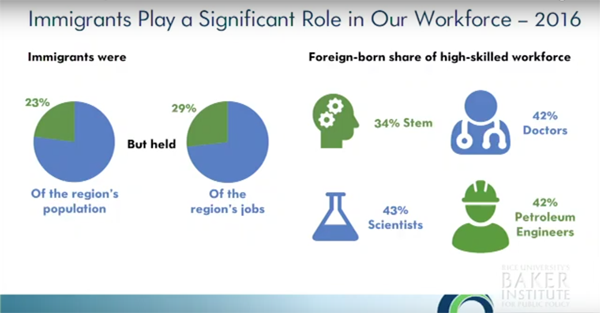The Future of Immigration in Houston
 Business leaders and professionals met at Rice University’s Baker Institute for Public Policy to hear from experts who shared current data and research on immigration in Houston at an event co-sponsored by the Baker Institute Mexico Center, New American Economy and the Center for Houston’s Future last Thursday.
Business leaders and professionals met at Rice University’s Baker Institute for Public Policy to hear from experts who shared current data and research on immigration in Houston at an event co-sponsored by the Baker Institute Mexico Center, New American Economy and the Center for Houston’s Future last Thursday.
“Houston is a city that knows how to value individual merit, hard work, and the contributions of all its residents,” said Dr. Tony Payan, Françoise and Edward Djerejian Fellow for Mexico Studies and Director of The Baker Institute’s Mexico Center, adding that every worker in Houston from doctors and engineers to landscapers and line-cooks help make Houston the growing and robust economic engine that it is.
Payan said that the US immigration is broken. It's underfunded, understaffed, overwhelmed, and hostage to poisonous rhetoric, in large part because immigration and its effects are often misunderstood. “We understand merit, hard work, tolerance, and diversity because it is part of who we are…we are puzzled by our political leaders in Austin and Washington who do not always understand that communities like Houston grow, prosper, and fulfill their destiny in large part because of all these new arrivals,” he said.
A theme of discussions was about how those in attendance could help pass much-needed immigration reform. Stan Marek, CEO of MAREK, spoke about the importance of business leaders speaking out and doing their part. “We’ve got to get the business community energized...we drive this city, we build this city,” he said.
Marek also talked about the importance of educating people about the facts surrounding immigration, which in part is being accomplished by a series of videos called Rational Middle. “Rational Middle is about educating and energizing voters on the immigration issue, but it’s also about providing political cover for our elected officials,” he said.
Before screening one of the videos in the series called "Immigration’s Crossroad: Rebuilding after Hurricane Harvey,” Gregory Kallenberg, Director and Producer of the Rational Middle videos, commented about how he and his team decided to approach the complex topic of immigration in order to reach an audience of Americans with polarized opinions. “At the end of the day, while this certainly is a humanitarian issue, for the United States, it’s an economic issue…If we’re just looking at the selfish reasons to have immigrants here, there are a phalanx of reasons why immigrants need to be here and are doing good things for our country,” he said.
The video highlighted the shortage of construction workers in Houston, how that was exacerbated by Hurricane Harvey, and the adverse effects that the shortage of workers has had.
In the video, Mike Holland, COO of MAREK, made the point that industries like construction are facing a workforce crisis, especially in the aftermath of Hurricane Harvey. “We have an exiting generation of boomers, at a rate of 10,000 a day are retiring, and we’re seeing a big gap in the workforce.”

Marvin Odum, Chief Recovery Officer for the city of Houston, also expressed concern about the workforce shortage and the extended time of suffering that people who have lost their homes and cannot find the help they need to get them rebuilt will face as a result. “We need to find a way to bring those people out of the shadows to allow them to work and pay taxes while they work on obtaining legal status… As a representative of the city, I need a legal way to be able to access that workforce… Not necessarily trying to convert those individuals to full-fledged legal citizens, but this idea, can you get identification, can you get put into a special category, we would love for that to happen.”
Following the video, a panel led by Jay Root with the Texas Tribune, Jeremy Robbins, Executive Director of New American Economy (NAE), presented the NAE’s and Center for Houston’s Future’s new reports revealing economic data on immigrants in Houston. He explained that there are 1.6 million immigrants in Houston, and although they make up 23.3% of the city’s population, they make up 30.6% of its labor force. They also play a critical role in meeting labor challenges in several key industries in the metro area, as foreign born workers make up 50.4% of construction, 43.1% of general services, 35% of accommodation and recreation, 32% of professional services, 31.9% of manufacturing, and 33.9% of STEM workforces in Houston, he explained.
Robbins also highlighted the enormous fiscal and economic impacts that Houston’s immigrants have on the local and national levels, revealing that in 2016 they paid $9.2 billion in federal taxes and $3.5 billion in local and state taxes. When those taxes were subtracted from the Houston immigrants’ total income of $50.9 billion, it left them with $38.2 billion of spending power to inject into the economy. He explained that because immigrants are more likely to be of working age and they are mostly coming here for the opportunity to work, they are net contributors to things like social security and Medicaid that people pay into when they are working.
Robbins also said that in the current state of the economy at 3.8% unemployment, immigrants can play a valuable role in filling jobs that Americans are unavailable to fill. He noted that in Texas, there are currently 13 unfilled STEM jobs for every one unemployed STEM worker in Texas. “You simply are not filling the jobs that need to be filled, and these are jobs that help innovate and create more jobs,” he said. The solution to workforce shortages in critical industries like this, Robbins explained, is to encourage and make sure that Americans have the resources to pursue those professions, but also to welcome immigrants who are willing fill open jobs.
Brett Perlman, President and CEO of Center for Houston’s Future, highlighted the valuable role that highly-skilled immigrants play in Houston’s workforce, noting that they make up 42% of doctors, 43% of scientists, and 42% of petroleum engineers. He explained that according to their study, immigrants will drive employment growth in Houston in the coming years because natives are not having enough children, and that in 2036, immigrants will make up 43% of Houston’s workforce compared to 30.6% in 2016.
Perlman went on to reveal the results of a study that predicted the effects of three different immigration scenarios on Houston’s GDP in 2036. If immigration is decreased by 30%, then Houston would lose $51 billion in GDP. If all undocumented immigrants are deported, then Houston would lose $36 billion in GDP. However, if immigration is increased by 30%, then Houston would gain $67 billion in GDP. Although these immigration scenarios are hypothetical, they reveal the significantly positive economic impact that immigrants have on Houston’s economy. “The simple song that I want you to take away is that in order for Houston’s economy to continue to grow, we need immigrants,” he said.
Dr. Payan addressed the question that immigrants hurt the wages of native born workers. “The answer is no, but not completely,” he said. “The evidence shows that the people who are most [adversely] affected are those who didn’t graduate high school…depending on the study you look at, the impact can be as much as 2% wage suppression among the very lowest skilled workers in the US. At the higher levels, they don’t. They actually make the workforce stronger and more competitive,” he said, adding that they increase economic growth as consumers.
In response to a question about what good immigration policy should look like, Payan called for a guest worker and green card program that will be indexed to economic performance, as opposed to the current system that is hard set with a set number of visas and country quotas. The ideal immigration system, he explained, should respond to the conditions of the economy, society, and labor market. “What we need is a system that will be indexed… to increase and decrease the number of green cards, refugee permits, and guest worker visas to move with the economy,” he said.








